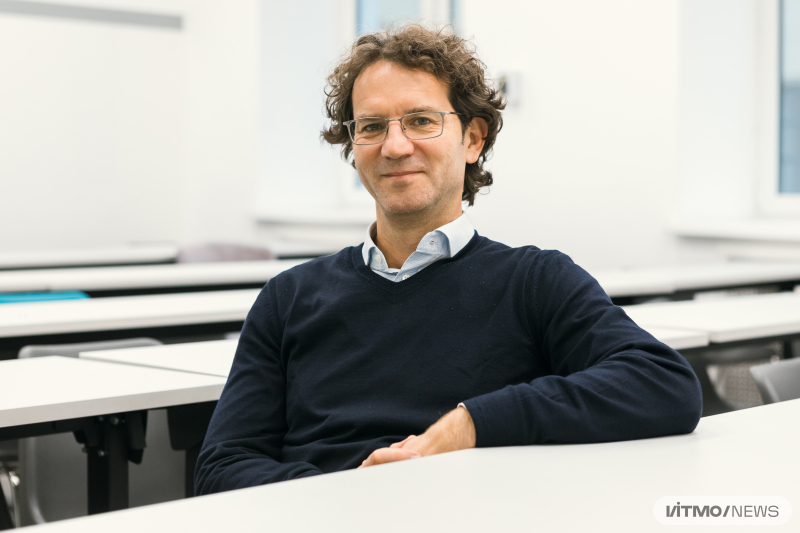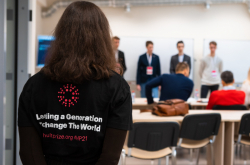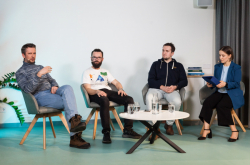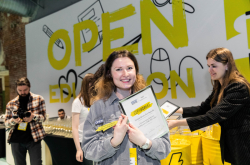Your professional interests are very broad, from social entrepreneurship and innovation to creative practices and corporate culture. How do you define your profession?
I’ve done a lot of things. For me, it's not easy to say what my profession is. I trained to be an English teacher, and that’s what I did at the start of my career: I taught English and drama at Middle East Technical University in Turkey. After two years, I left this job, graduated with a Master’s in management, and started growing in this field.
For seven years, I managed my own agricultural production – I grew raspberries, strawberries, and blackberries. However, that wasn’t the only thing I did. I created a full-scale agricultural due diligence system: the company analyzed the ecosystem factors (climate, soil, plants) and the social and economic factors. From this data, we prepared a report for agricultural investors. Equipped with this information, they could decide which agricultural projects to develop in which regions. Then, I sold this company and turned to project management for private organizations; I also assisted entrepreneurs in finding investors and buyers for their companies.
However, I didn’t leave the academic environment. At 50 years old, I defended my PhD in organizational studies and I continue teaching people, but now those in other positions. As a consultant, I reorganized the training process for the staff of the Istanbul Chamber of Industry. As a mentor, I help startups commercialize business models and scale their products at accelerators. As a coach, I develop educational courses and teach employees of companies, as well as students of Özyeğin University. There, I teach courses on social entrepreneurship and innovation, Creativity and Innovation, and I support their project efforts.
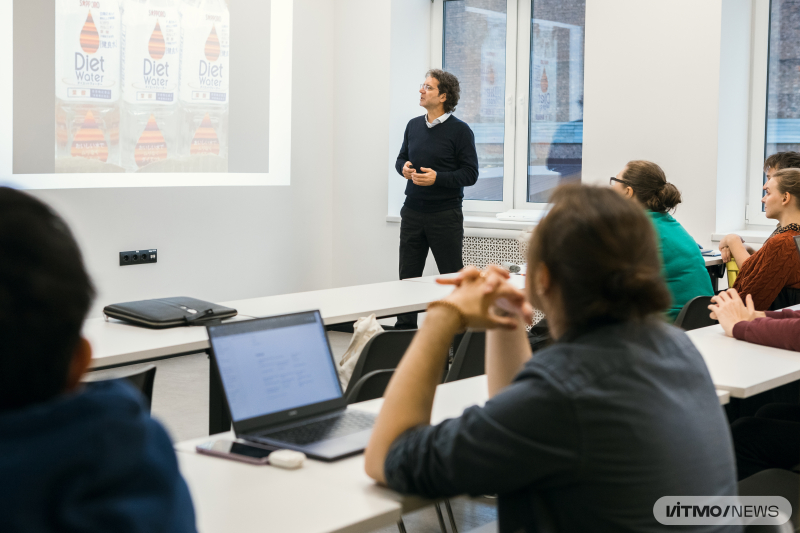
Meriç Biçakçioğlu delivering a lecture at ITMO. Photo by Dmitry Grigoryev, ITMO.NEWS
So how did you get acquainted with ITMO?
It was back in 2019. ITMO had an opening for a position of a soft skills lecturer in presentations, pitches, and entrepreneurship. My friend and colleague from Özyeğin University couldn’t come, so I was asked to go in his place.
When I first came to St. Petersburg, I found it very beautiful. I liked the weather and the water because I also come from a city on water, Istanbul. St. Petersburg is very modern, but also very traditional, historically traditional city. I think ITMO is a very futuristic, progressive university. It always looks for changes, new ideas and novel people. I sometimes joke that I have become old here and they will have to look for someone more modern soon.
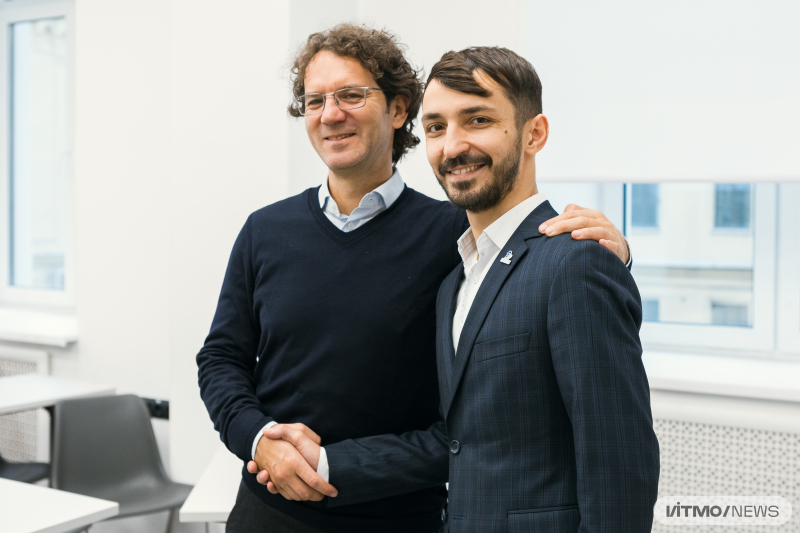
Meriç Biçakçioğlu and Mikhail Kurushkin, Dean of the Faculty of Biotechnologies. Photo by Dmitry Grigoryev, ITMO.NEWS
You are one of the lecturers for the course International Research Management Essentials at ITMO. What is it about?
I teach the students about presentations and how to pitch their ideas to an interested audience. We talk about transforming research projects into business presentations. In other words, we put business suits on scientific ideas. However, it's not easy – you need to give clear examples and simple structures to explain to students that it's not only about science. I think science is very important, but business is also science when you look at it. Science is a complicated language that you need to translate into lay terms, into terms that everybody can understand. What’s the purpose of this research project? Who will benefit from it – consumers or companies? Why did you pick this specific target audience? If this project has a product, how will it sell?
These are the questions we look at in class, trying them out in practice: we make projects, create stories, and play. But I never organize exams. For me, testing isn't about gauging the final result, but making a "diagnosis". It’s like a medical test: your blood values are not well, so you should take care of this or that. So when I do a quiz or a paper, I always send it back and explain what should be addressed. There should always be room for self-improvement.
Do you think Russian students are different from students in other countries?
Well, students are similar everywhere: you speak and they listen. But it’s boring. So my style is to have open classes, where students move around a lot and work in teams. During my first class, it turned out that students here love learning and do a lot of research. In class, we discuss ideas, talk, and make jokes.
And one time I had a student who asked: “What did we learn?” And I said: “You learned about life.” This is how business works. If you express everything in scientific jargon, no one will listen to it in the business world. Instead of presenting your hypotheses, you should be talking about the implications of your study on our lives with real-life examples. Otherwise, at a business presentation, you might talk for a long time and then hear: “So what?”
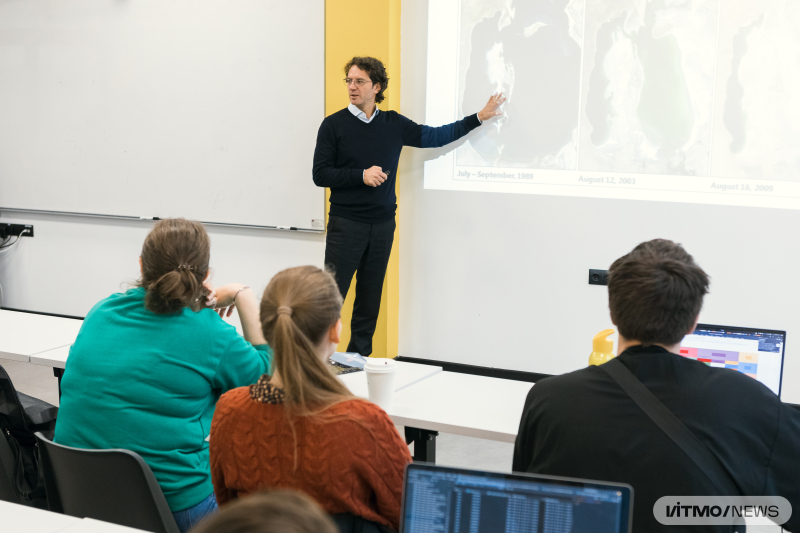
Meriç Biçakçioğlu delivering a lecture at ITMO. Photo by Dmitry Grigoryev, ITMO.NEWS
What is more difficult, teaching or doing business?
I like business, but I love teaching – it’s not about making money, but about helping people grow. In business, there are always negotiations and two sides that have to reach an agreement, a win-win situation. This balance is selfish, because you are always thinking about yourself, not others. In teaching, you think about your students first.
This links to the topic of your course at ITMO. This year, students were asked to develop a project within one of the UN’s Sustainable Development Goals, either No poverty or Zero hunger. Why did you choose this subject?
The SDGs are guidelines for countries and their different institutions, universities, private companies, and NGOs. These guidelines aim to make the world a better place in different respects – by saving marine and land ecosystems, combating climate change, improving access to education and medicine, and so on.
These are global goals, which you cannot achieve on your own; however, anyone, even young researchers, can contribute. In the course, we asked our students to pick one of the two goals and make a research project on the topic. At the start, students decided who would benefit from their ideas and how. These projects can also be scaled. For instance, you may start with an initiative for children with one condition and then develop it to help people with similar conditions.
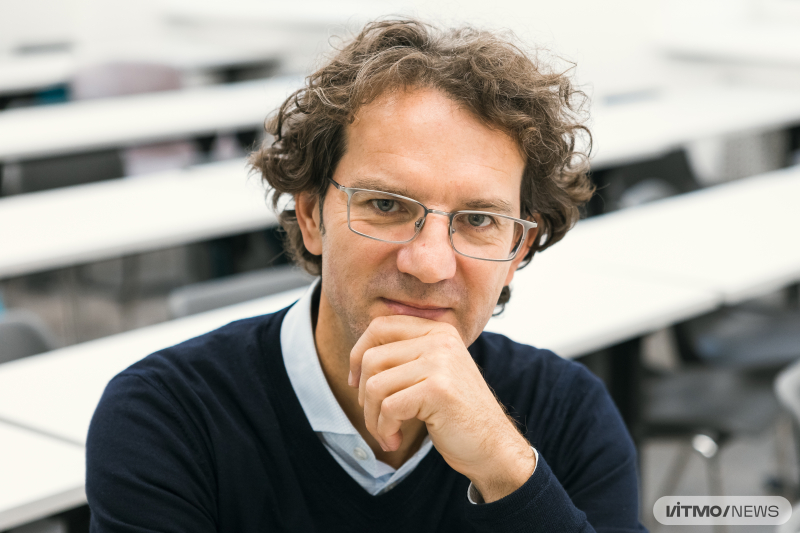
Meriç Biçakçioğlu. Photo by Dmitry Grigoryev, ITMO.NEWS
And what about business? Do SDGs matter if your main goal is to produce profit?
There’s an American Indian saying: ”When the last tree has been cut down, the last fish caught, the last river poisoned, only then will we realize that one cannot eat money.” We have to understand that profit is good, but it isn’t everything. I believe that companies have to not only make money but also help the environment and society. This way, we will be happier.
However, social entrepreneurship isn’t an easy task, it’s more like an oxymoron. On one hand, we call it social, meaning the environment and the society is the beneficiary. But, on the other hand, entrepreneurship is about using business models, about profit and economy. We are trying to balance out these two ideas. It's very difficult because investors say: “When do we earn money?” That’s because the return on investment in social entrepreneurship is longer than normal companies. The good part is that many investors are now aware of that, so they try to support social projects more.
